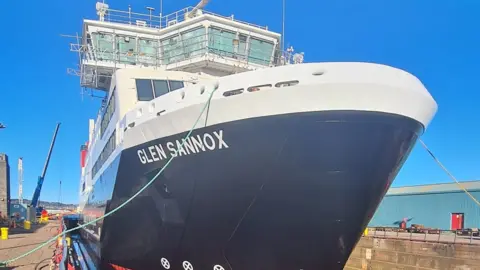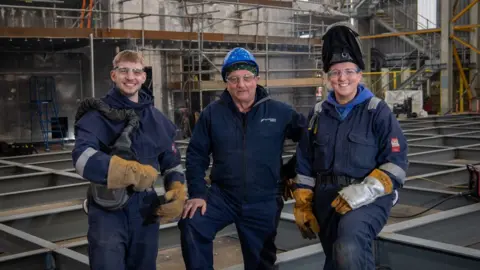CalMac racks up £1.6m crew bill for unfinished Glen Sannox ferry
 FMPG
FMPGFerry operator CalMac has run up a £1.6m bill for crewing costs for the Glen Sannox ferry which is still being built at Ferguson shipyard.
CalMac began hiring officers and engineers in February 2022, six months ahead of expected delivery of the ship.
But the following month the delivery date was put back to May 2023, and it has since slipped again to the autumn.
CalMac said it had hired 14 staff to date, which are part of the build costs funded by the government.
While it is usual for a ferry operator to start recruiting staff ahead of delivery of a new ship, the BBC understands the shipyard is puzzled as to why recruitment went ahead in February 2022 as it says discussions were already taking place about further delays in construction.
CalMac said the crew appointments were all approved by the yard to align with expected vessel delivery date.
By March this year it had taken on three masters, three chief engineers, three second engineers and five third engineers. Most of them have been employed since February last year.
The £1.6m in crew costs includes salary, travel, subsistence, pension and national insurance contributions but excludes training.
 Andrew Cowan
Andrew CowanThe ferry operator, which is wholly owned by the Scottish government, confirmed details of the crewing for Glen Sannox in response to a freedom of information request by Conservative MSP Edward Mountain. The story was first reported in the Herald on Sunday.
Mr Mountain told the BBC: "I think it is ridiculous that CalMac recruited staff so far in advance of the ship being delivered.
"If they honestly believed when they recruited them that these ships were only six months away from delivery, they must be living in a different universe."
CalMac said the recruitment had taken place to support the ongoing construction work at the nationalised Ferguson Marine shipyard, and as such, it would count as build costs for the ferries, paid for by the Scottish government.
A spokeswoman said: "The crew who have been deployed to the yard to work on MV Glen Sannox and Hull 802, have had their wages paid to them by CalMac.
"These costs are recovered by us from the yard's owners (strategic commercial assets division which is a part of the Scottish government's economic development directorate) via Transport Scotland.
"CalMac will become responsible for the costs of the staff once the vessels are delivered to CalMac."
'Design gaps and build errors'
The new transport minister Kevin Stewart has said he will look into the matter.
A Scottish government spokesperson said: "Senior crew positions such as vessel master and key engineering roles have been recruited and are undertaking essential commissioning and creation of safety management system tasks at the yard as various parts of the vessel are brought to life and tested.
"This is a normal process for all vessel deliveries."
CalMac began recruiting staff for Glen Sannox in the same month that David Tydeman took over as chief executive of Ferguson Marine, following the departure of government-appointed "turnaround director" Tim Hair.
It is understood that Mr Tydeman, upon becoming familiar with the state of construction, questioned the expected delivery schedules. The following month he announced the first in a series of new delays.
In his most recent update to MSPs, he said: "Regrettably, we continue to find design gaps and build errors, some dating back over many years, and whilst we are dealing with them successfully as they arise, we are progressing more slowly than planned."
Glen Sannox is expected to finally leave the shipyard this autumn, while a second CalMac ship still known only as Hull 802, is due for completion in late 2024.
 FMPG
FMPGAs it looks to its future, Ferguson Marine has now secured subcontracting work, building three steel units for HMS Belfast - one of the Type 26 frigates being constructed for the Royal Navy by BAE Systems in Glasgow.
Manufacturing of the units has started at its Port Glasgow site, and the units will later be transported to BAE's Govan yard for assembly.
Mr Tydeman said: "Today heralds a new era for commercial shipbuilding at Port Glasgow, one we have painstakingly planned and prepared for.
"It demonstrates the ability of our skilled workforce to secure complex new contracts in a commercial environment. And this is just the beginning. We plan to grow our expertise and capabilities to win additional commercial contracts and adjacent markets."
The shipyard also plans to bid for a contract to build a series of small CalMac vessels, similar to ones which it has successfully delivered in the past.
